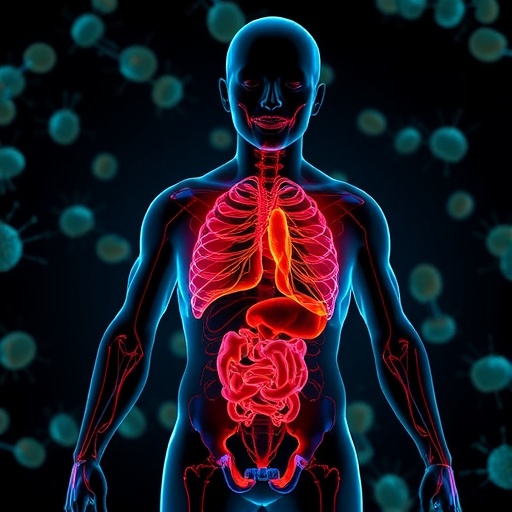In recent years, increasing attention has been paid to the intricate relationship between diet, gut microbiota, and human health. A pivotal study led by an accomplished team of researchers, including Chen, Feng, and Gong, has shed light on the increasingly concerning impact of high-salt diets on gut microbiome function. This research presents groundbreaking insights, revealing that a high-salt intake can significantly exacerbate prostatitis—the inflammation of the prostate gland—through modifications in gut microbiota, which subsequently engage specific immune pathways. Their findings lead us to a critical understanding of the AHR/SGK1/FOXO1 axis’s role in promoting Th17 cell differentiation.
In the human body, the gut microbiota represents a complex community of microorganisms that play a vital role in various physiological processes, including digestion, metabolism, and immune regulation. When the delicate balance of this microbial ecosystem is disrupted, through factors such as dietary changes, it can lead to dysfunction, which has been associated with various diseases. The current findings highlight that a high-salt diet can significantly alter gut microbial balance, leading to an inflammatory milieu that potentially contributes to prostatitis.
The study illustrates that high salt intake not only harms gut microbiota but also influences immune function. The researchers investigated how shifts in gut microbial communities can catalyze inflammatory responses. Specifically, they focused on how high-salt conditions favored specific microbial species that promote the differentiation of Th17 cells—immune cells known to play a pivotal role in inflammation and autoimmunity. This suggests a mechanistic link between dietary habits, gut health, and inflammatory diseases such as prostatitis.
Additionally, the research identifies key signaling pathways involved in this process. The AHR (Aryl hydrocarbon Receptor), SGK1 (serum/glucocorticoid-regulated kinase 1), and FOXO1 (Forkhead box O1) axis emerged as crucial players in mediating the impact of gut microbiota on Th17 cell differentiation. The activation of this pathway under high-salt conditions appears to be a central mechanism through which dietary salt exacerbates inflammatory responses in the prostate.
Moreover, the implications of the research extend beyond prostatitis. This work raises questions about how dietary salt can influence immune health at large, potentially implicating a variety of conditions characterized by immune dysfunction. As the prevalence of high-salt diets continues to increase globally, understanding their broader impact on chronic inflammatory conditions is imperative.
Throughout this study, the researchers employed a multidisciplinary approach that included microbiological analyses, immunological assessments, and bioinformatics. This comprehensive strategy ensured a detailed understanding of how salt-driven changes in the gut microbiome can lead to observable biological changes in immune profiles. The evidence amassed from various experimental modalities provides a robust foundation for advocating dietary modifications as potential preventive strategies against inflammatory conditions.
Clinical ramifications of this study are profound. While current treatments for prostatitis primarily focus on symptomatic relief and addressing acute infections, this research suggests that dietary interventions could serve as an adjunctive therapeutic approach. By reducing sodium intake, patients may not only improve their gut health but also mitigate the inflammatory responses that contribute to prostatitis.
However, dietary modification alone may not suffice. Further investigations are warranted to understand the complexities of gut-brain interactions and how various factors, including genetics and other environmental influences, may modulate individual responses to dietary salt. This aspect underscores the need for personalized medicine approaches in the management of diseases linked to gut microbiota dysfunction.
Importantly, public health initiatives must reflect these scientific findings. There should be increased awareness around the dangers of high-salt diets, along with strategies to promote lower sodium consumption in everyday food choices. Such changes could be instrumental in preventing the cascade of immunological responses that may lead to chronic health issues, including prostatitis.
In summary, the intersection between diet, gut microbiota, and immune function is proving to be a fertile ground for further exploration. The work by Chen and colleagues serves as a critical reminder of how dietary choices can ripple through our biological systems in unexpected ways. As researchers continue to unveil the profound mechanisms connecting the gut and immune functions, it is essential for individuals and healthcare professionals to reconsider the health implications of dietary habits.
In conclusion, the evidence presented in this study is a call to action. Addressing dietary salt intake may serve as a key strategy in managing prostatitis and potentially other inflammatory diseases deriving from gut microbiota dysbiosis. As the science evolves, it is the responsibility of the medical community and the general public to adapt and embrace findings that could lead to healthier lives.
Subject of Research: The relationship between high-salt diets, gut microbiota dysfunction, and prostatitis.
Article Title: High-salt-driven gut microbiota dysfunction aggravates prostatitis by promoting AHR/SGK1/FOXO1 axis-mediated Th17 cell differentiation.
Article References:
Chen, J., Feng, R., Gong, BB. et al. High-salt-driven gut microbiota dysfunction aggravates prostatitis by promoting AHR/SGK1/FOXO1 axis-mediated Th17 cell differentiation.
Military Med Res 12, 21 (2025). https://doi.org/10.1186/s40779-025-00607-1
Image Credits: AI Generated
DOI: 10.1186/s40779-025-00607-1
Keywords: Gut microbiota, high salt diet, prostatitis, Th17 cells, immune response, AHR/SGK1/FOXO1 axis.




